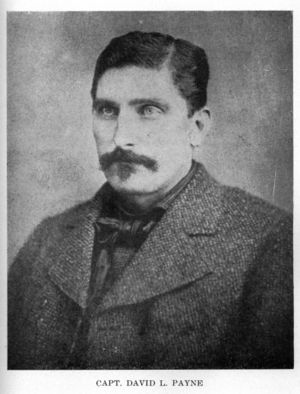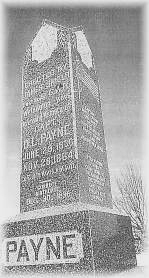Captain David Lewis Payne
Contents
Introduction
Father of Oklahoma, Oklahoma Moses, Prince Boomer and Ox Heart are all names given to one brave man from Indiana (Captain David 5). His heroic efforts and accomplishments gave way for new settlement in the west. Captain David Lewis Payne led several groups of settlers into the lands known as the Oklahoma Territory. David Payne’s military and political accomplishments aided in the advancement and expansion of America (Appendix A).Early Years
David Lewis Payne was born on December 30, 1836 in Grant County, Indiana, on a farm near the small town of Fairmount. He was the son of William and Celia Lewis Payne. As a child Payne worked on his father’s farm and attended the local rural school during the winter months (Baldwin 209). In the spring of 1858, at the age of twenty–one, Payne and his brother, Jack, left home and began traveling west. Their hope was to eventually join the Mormon War but their intentions changed once they crossed the Missouri River. The brothers stopped in Burr Oak Township in Doniphan County, Kansas. There, Payne obtained a small portion of land on which he built a saw mill. The saw mill was not successful and Payne began to hunting to support himself. Soon after, Payne was hired by the government to scout for expeditions. This job would eventually lead to his exploration of the Oklahoma territory (Osburn 1).
Military and Political Accomplishments
At the beginning of the Civil War Payne enlisted in the 10th Kansas Volunteer Infantry. Because of his courageous conduct he was immediately promoted to captain. He served from August 1861 to August 1864. After his service Payne went back to Doniphan County and was elected to the Kansas Legislature, where he served in the 1864 and 1865 sessions (Osburn 2). In March of 1865 Payne enlisted for one year in the 15th Kansas Cavalry. This particular unit was brought up in response to a state legislative resolution calling for the governor to organize a regiment of veteran volunteers to protect western Kansas from Indian activity (Warr 214). In July of 1867, Governor Crawford issued a public statement calling for volunteers to protect the Kansas people from Indian attacks. As a result, the 18th Kansas Cavalry was set up. Payne enlisted with the cavalry and proceeded to serve his duties. In 1868 Payne once again enlisted into the service, this time with the 19th Kansas Cavalry. This regiment was organized in October 1868 to serve in a winter operation against Indians on the Western Plains. Payne then moved to Sedgwick County, Kansas where he was again elected as Senator to the State Legislature (Osburn 2). Payne’s experiences and contributions in politics eventually led to his appointments as Postmaster at Fort Leavenworth on March 19, 1867. Payne also had the honor of being the Assistant to the Doorkeeper of the United States House of Representatives (Davis 146).
Oklahoma Territory
In 1881, Captain Payne got an idea of starting stimulation for the opening of the Oklahoma Territory. He began formulating bills that he sent out describing his purpose to open Oklahoma for settlement. In his bills Payne stated he would locate parties on the land, and form a stock company to finance the necessary funds that would be needed to follow through with the operation. Shares for the stock sold for five dollars each. About three thousand different investors became apart of Payne’s plan and in 1883, Payne and the stockholders moved into the Territory (Baldwin 212). There Payne and his party laid out a town that was named Ewing. The fourth cavalry soon arrested Payne and his party for their actions of trying to settle. Payne and his team were taken to Ft. Reno, and then were later escorted back to Kansas and freed. Payne was enraged because as stated by public law the military were prohibited from interfering in civil matters. Payne and a larger party returned to Ewing in July (Captain David 5). The cavalry yet again arrested the party and escorted them back to Kansas. Once more Payne was freed but was forced to appear in court in Ft. Smith, Arkansas. There, Payne was charged under the Intercourse Act. He was fined one thousand dollars, but since he had no money or property, the fines were dropped (Osburn 3). During his expedition into the Cherokee Outlet in 1884, Payne was once again arrested by the army. Instead of returning him to Kansas, he was taken several hundred miles, under grueling physical conditions, to Ft. Smith. He was then turned over to the United States District Court in Topeka, Kansas. Judge Cassius G. Foster repealed his indictments and ruled that settling on the Unassigned Lands was not a criminal offense. Boomers celebrated the verdict but then were soon shot down when the government refused to accept the decision. Payne finally planned another expedition, but this would be his last. On the morning of November 28, 1884, in Wellington, Kansas David Payne collapsed and died at his breakfast table. His funeral at the Methodist Episcopal Church in Wellington filled with thousands of his followers and family. The Boomer movement could not be stopped though. Within days of his death, Congress introduced a bill for the purpose of authorizing the opening of the Oklahoma settlement (Captain David 5).
Conclusion
In 1995 Payne’s family, after trying for almost a century, was able to have his remains moved to Oklahoma. On April 22, 1995 a monument was built to dedicate David Lewis Payne (Appendix B). His final resting place is in the park overlooking Boomer Lake in Stillwater, Payne County, Oklahoma (Osburn 3). David Lewis Payne’s accomplishments, politically and militaristically, are still sought today as something amazing. His efforts and determination showed American people that one person can make a difference.Written By
Neal Patel
Work Cited
Baldwin, Edgar M. The Making of a Township: Fairmount Township. Edgar Baldwin Printing Company. 208-219.
"Captain David L. Payne Memorial Webpage." Oklahoma. 15 May 2007 <http://geocities.com/pheon.geo/CaptainPayne.htm>.
Davis, James W. History of Oklahoma: the Boomers. Imogene Sawvell Davis. 142-153.
Osburn, William H. "David L. Payne." Wikipedia. 15 May 2007 <http://en.wikipedia.org/wiki/David_L_Payne>.
Warr, Ann, and Harry Warr. Area History of Fairmount, Indiana. Curtis Media Inc., 1997. 210-219.

